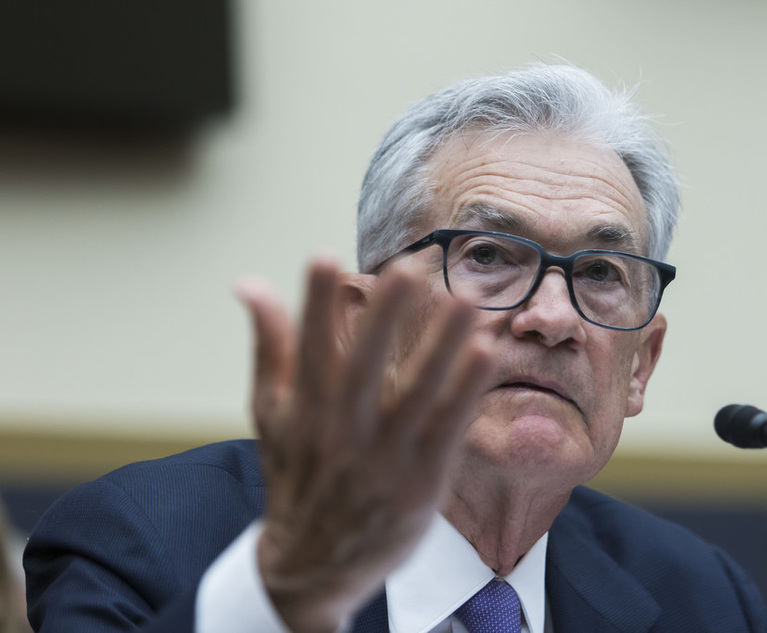 Jerome Powell
Jerome Powell
Federal Reserve Chair Jerome Powell told lawmakers that the central bank is in no rush to lower interest rates as officials wait for more clarity on the economic impact of President Donald Trump’s tariffs. “The effects of tariffs will depend, among other things, on their ultimate level,” Powell said Tuesday in remarks before a congressional panel. “For the time being, we are well-positioned to wait to learn more about the likely course of the economy before considering any adjustments to our policy stance.”
Powell’s remarks before the House Financial Services Committee come on the heels of the Fed’s decision last week to leave interest rates unchanged, in a range of 4.25 percent to 4.5 percent.
Recommended For You
“If it turns out that inflation pressures do remain contained, then we will get to a place where we cut rates, sooner rather than later,” Powell said in response to a question about the possibility of a July rate cut. “But I wouldn’t want to point to a particular meeting. I don’t think we need to be in any rush because the economy is still strong.”
Fed officials signaled last week they favor two rate cuts by year’s end. Economists surveyed by Bloomberg expect a cut to come by September. Powell, however, underscored that uncertainty in the economic outlook means a wide set of outcomes remain possible. Should inflation come in weaker than expected or the labor market deteriorate, he said, the Fed could cut rates sooner. Equally, he added, higher-than-expected inflation could push the Fed to keep holding. “Many paths are possible here,” Powell said.
He acknowledged that recent data supported a case for lower rates. But, he emphasized, that data was backward-looking, and many economists expect “a meaningful increase in inflation” over the course of this year due to tariffs. “At this time, all forecasters are expecting pretty soon that some significant inflation will show up from tariffs,” he said. “We can’t just ignore that.”
Powell’s appearance coincided with the release of a weaker-than-anticipated consumer confidence gauge for June.
The central bank’s on-hold position has angered President Trump, who has consistently called for lower rates and argued that the Fed is keeping borrowing costs for the U.S. government high by holding rates steady. “‘Too Late’ Jerome Powell, of the Fed, will be in Congress today in order to explain, among other things, why he is refusing to lower the rate,” Trump said on social media early this morning. “I hope Congress really works this very dumb, hardheaded person, over. We will be paying for his incompetence for many years to come.”
Powell and several other policymakers have pointed to increased economic uncertainty stemming from the Trump administration’s stepped-up use of tariffs, and other policy changes, to justify leaving rates steady for now. Many forecasters expect the tariffs to put upward pressure on inflation and dent economic growth, although those estimates carry significant uncertainty. Trump has frequently shifted on the specifics of his tariff policies, and the administration says it’s working on trade deals that could affect the nature and level of the duties.
“Expectations of that level, and thus of the related economic effects, reached a peak in April and have since declined,” Powell said in his opening statement, which largely echoed remarks he delivered last week. “Even so, increases in tariffs this year are likely to push up prices and weigh on economic activity.”
Tariff Effect
Powell said the tariffs’ impact on inflation could be short-lived or possibly be more persistent. Avoiding the latter outcome “will depend on the size of the tariff effects; on how long it takes for them to pass through fully into prices; and, ultimately, on keeping longer-term inflation expectations well-anchored,” he said.
Economic data so far has shown limited impact from tariffs. Fed Governors Christopher Waller and Michelle Bowman have pointed to that dynamic, among other factors, in arguing the Fed could cut rates as soon as its next meeting in July.
Meanwhile, Powell described the overall economy and labor market as solid. He said inflation has eased significantly from highs reached in mid-2022, but remains somewhat elevated above the Fed’s 2 percent objective. He added that beyond the next year or so, most measures of longer-term expectations remain consistent with the Fed’s inflation goal.
————————————————————
© Touchpoint Markets, All Rights Reserved. Request academic re-use from www.copyright.com. All other uses, submit a request to [email protected]. For more inforrmation visit Asset & Logo Licensing.



